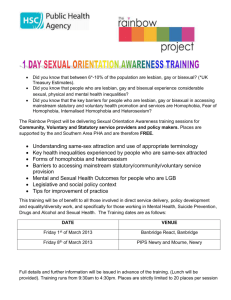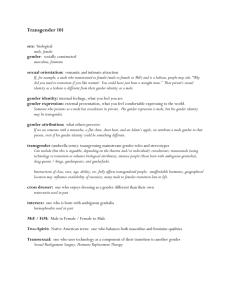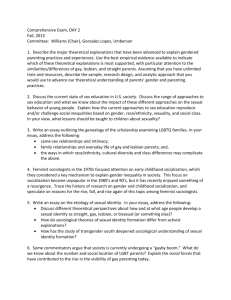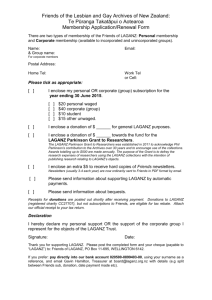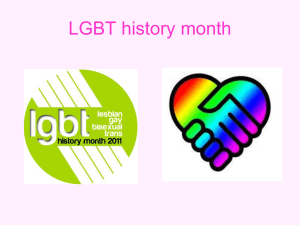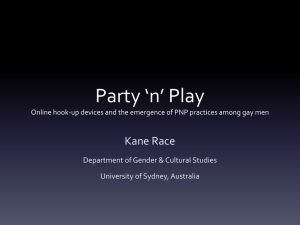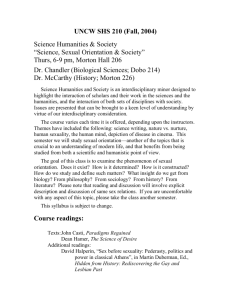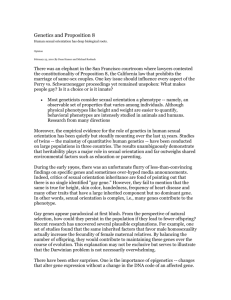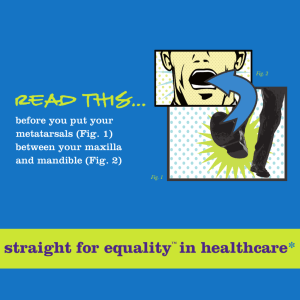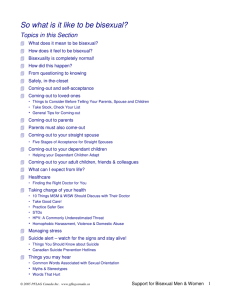LGBT definitions
advertisement
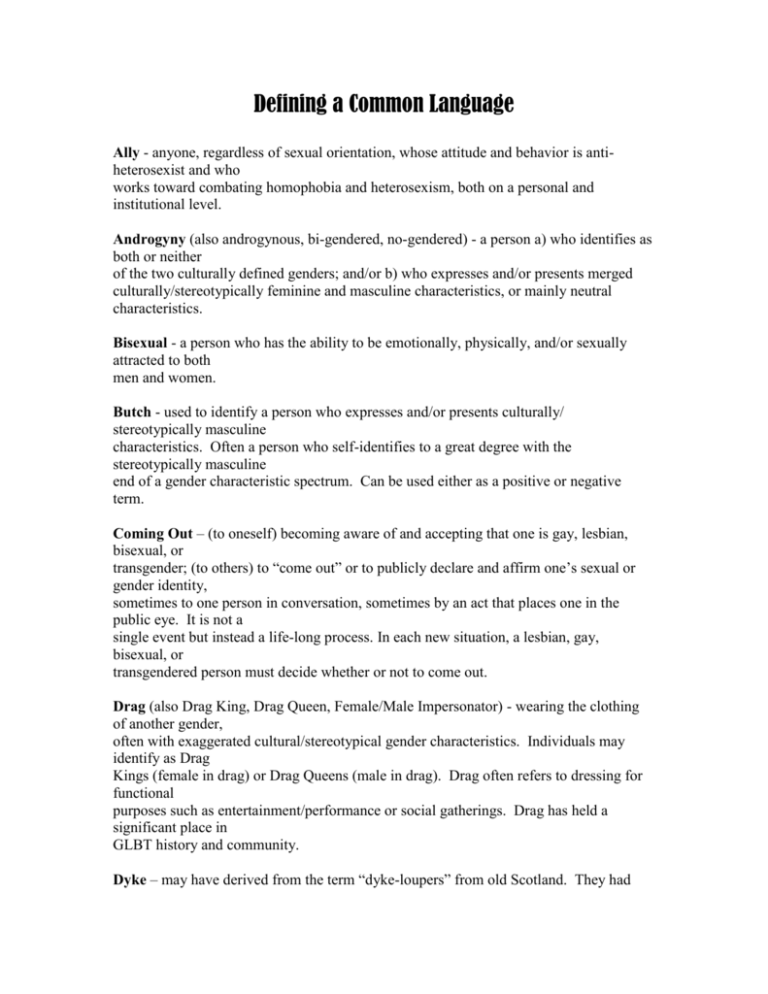
Defining a Common Language Ally - anyone, regardless of sexual orientation, whose attitude and behavior is antiheterosexist and who works toward combating homophobia and heterosexism, both on a personal and institutional level. Androgyny (also androgynous, bi-gendered, no-gendered) - a person a) who identifies as both or neither of the two culturally defined genders; and/or b) who expresses and/or presents merged culturally/stereotypically feminine and masculine characteristics, or mainly neutral characteristics. Bisexual - a person who has the ability to be emotionally, physically, and/or sexually attracted to both men and women. Butch - used to identify a person who expresses and/or presents culturally/ stereotypically masculine characteristics. Often a person who self-identifies to a great degree with the stereotypically masculine end of a gender characteristic spectrum. Can be used either as a positive or negative term. Coming Out – (to oneself) becoming aware of and accepting that one is gay, lesbian, bisexual, or transgender; (to others) to “come out” or to publicly declare and affirm one’s sexual or gender identity, sometimes to one person in conversation, sometimes by an act that places one in the public eye. It is not a single event but instead a life-long process. In each new situation, a lesbian, gay, bisexual, or transgendered person must decide whether or not to come out. Drag (also Drag King, Drag Queen, Female/Male Impersonator) - wearing the clothing of another gender, often with exaggerated cultural/stereotypical gender characteristics. Individuals may identify as Drag Kings (female in drag) or Drag Queens (male in drag). Drag often refers to dressing for functional purposes such as entertainment/performance or social gatherings. Drag has held a significant place in GLBT history and community. Dyke – may have derived from the term “dyke-loupers” from old Scotland. They had “louped” or jumped over the “dyke” or low wall that divided the fields and had gone over to the other side. The word dyke represents the wall itself - hard, strong, rigid - and the concept of crossing over, of partaking of both the masculine and feminine worlds, is lost altogether. Recent history has abused lesbians with the use of the term in a hateful manner. Within the community, some have grasped the term as a pride word. Effeminate - used to identify a person (usually male) who expresses and/or presents culturally/ stereotypically feminine characteristics. This is often viewed as a culturally negative term. F2M/FTM (Female to Male) - used to identify a person who was female-bodied at birth and who identifies as male, lives as a man, or identifies as masculine. Faggot (Fag) - according to Webster’s, “a bundle of sticks or twigs.” Historically, gay men were gathered, tied together and used for “kindling” when burning someone at the stake who was worthy of a “real” execution (like a witch or a heretic). Within the community, some have grasped the term “fag” from its painful past and use it as a pride word. Family of Choice - persons forming an individual’s social, emotional, and practical support network and often fulfilling the functions of blood relations. Many GLBT people are rejected when their families learn of their sexual orientation or gender identity, or they may remain “closeted” to their biological relatives. In such cases, it is their partner/significant other and close friends who will be called on in time of illness or personal crisis. Family of Origin - biological family, or the family in which one was raised. These individuals may or may not be part of a GLBT person’s support system. Femme - a person who identifies with being a woman, who understands the power and seduction of the feminine spirit and one who is willing to be powerful as a woman. Can be used to identify a person who expresses and/or presents culturally/stereotypically feminine characteristics. Can be used either as a positive or negative term. Gay - a homosexual person, usually used to describe males but may be used to describe females as well. Gender Dysphoria - an intense continuous discomfort resulting from an individual's belief in the inappropriateness of their assigned gender at birth and resulting gender role expectations. Also, clinical psychological diagnosis, which many in transgender communities are offended by, but is often required to receive hormones and/or surgery. Gender Identity - one’s psychological sense of oneself as a male or female. Gender Roles - the socially constructed and culturally specific behavior and appearance expectations imposed on women (femininity) and men (masculinity). Heterosexual - a person who is emotionally, physically, and/or sexually attracted or committed to members of the other sex. Heterosexism - the assumption or belief that everyone is heterosexual, and if not, they should be. The systematic oppression of lesbian, gay and bisexual persons is directly linked to sexism, including prejudiced attitudes or discriminatory practices against homosexuals. Homophobia - a fear of homosexuals, homosexuality, or any behavior, belief, or, attitude of self or others which does not conform to rigid sex-role stereotypes. It is the fear that enforces sexism and heterosexism. The extreme behavior of homophobia is violence against homosexuals; disapproval and unreasoning fear towards gays, lesbians, and bisexuals based on myths and cultural heterosexism. Homosexual - a person who is emotionally, physically, and/or sexually attracted or committed to members of the same sex. A clinical term that originated in the late 1800’s. Some avoid using the word because it contains the base word “sex.” The orientation has more to do with the issue of love than of sex, and it is believed that the use of “homosexual” devalues the orientation of individuals. The terms “gay, lesbian, and bi” are preferred by the majority of the community. Hormone Therapy (also Hormone Replacement Therapy, HRT) - administration of hormones to affect the development of secondary sex characteristics of the opposite assigned gender; HRT is a process, possibly lifelong, of using hormones to change the internal body chemistry. Androgens (testosterone) are used for female to males, and Estrogens are used for male to females. Internalized Oppression - the process by which a member of an oppressed group comes to accept and live out the inaccurate myths and stereotypes applied to the group. Intersexed (also Hermaphrodite) - an individual born with full or partial genitalia of both genders, or with underdeveloped or ambiguous genitalia. Surgery is common in infancy, when a singular gender is assigned. Many who have surgery develop feeling a sense of loss of an essential part of them. In the Closet - to be “in the closet” means to hide one’s gender or sexual identity in order to keep a job, a housing situation, friends, or in some other way to survive. Many GLBT individuals are “out” in some situations and “closeted” in others. Lesbian - a common and acceptable word for female homosexuals only; a name taken from the island of Lesbos where Sappho, the great women-loving poet of 600 BC lived. Most womenloving women adopt this name with pride. M2F/MTF (Male to Female) - used to identify a person who was male bodied at birth and who identifies as a female, lives as a woman, or identifies as feminine. Men who have Sex with Men (MSM) - the term is often used when discussing sexual behavior. It is inclusive of all men who participate in this behavior regardless of how they identify their sexual orientation. The acronym MSM is conventionally used in professional literature. Outing - disclosing someone’s sexual orientation or gender identity to another person without permission. Partner or Significant Other - primary domestic partner or spousal relationship(s). May also be referred to as “girlfriend/boyfriend,” “lover,” “roommate,” “life partner,” “wife/husband,” or other terms. Pre-Op (also Pre-Operative) - transsexual individuals who have not attained sex reassignment surgery, but who desire to and are seeking that as an option. They may or may not “cross-live” full time and may or may not take hormone therapy. They may also seek surgery to change secondary sex characteristics. Post-Op (also Post-Operative) - transsexual individuals who have attained sex reassignment surgery, and/or other surgeries to change secondary sex characteristics. Queer - a pejorative term for gay people, although many LGBT people have reclaimed this term as one that describes inclusive, non-heterosexual people. Sex Reassignment Surgery – (SRS) - permanent surgical refashioning of genitalia to resemble the genitalia of the desired gender. Sought to attain congruence between one's body and one's gender identity. Sexual Orientation - the inclination or capacity to develop intimate emotional and sexual relationships with people of the same gender (lesbian or gay), the other gender (heterosexual), or either gender (bisexual). Straight- a term originating in the gay community describing heterosexuals and meaning “to enter the mainstream,” or “to go straight.” Transgender (also Trans) - those who transgress societal gender norms; often used as an umbrella term to mean those who defy rigid, bipolar gender constructions, and who express or present a breaking and/or blurring of cultural/stereotypical gender roles. Includes: androgynes, cross-dressers, gender-benders, intersexed individuals, transvestites, and transsexuals. Transsexual (also Female to Male (FTM/F2M), Male to Female (MTF/M2F), PreOperative, PostOperative, Non-Operative) - a person who, through experiencing an intense long-term discomfort resulting from feeling the inappropriateness of their assigned gender at birth and discomfort of their body, adapts their gender role and body in order to reflect and be congruent with their gender identity. Includes: cross-living, synthesized sex hormones, surgery and other body modification which may or may not lead to the feeling of harmony between a person's body and gender identity. Transvestite (also Cross-dresser) - a man or woman who enjoys wearing the clothes of and appearing as the other gender. Reasons for cross-dressing can range from a need to express a feminine or masculine side to attainment of erotic/sexual/fetish gratification. While many are heterosexual, the use of transvestitism in the gay “drag” culture is well documented. Women who have Sex with Women (WSW) - the term often used when discussing sexual behavior. It is inclusive of all women who participate in this behavior regardless of how they identify their sexual orientation. The acronym WSW is conventionally used in professional literature.
